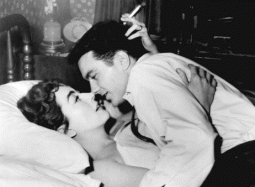 Vivienne once attended a Most Fashionable Party at the Most Fashionable New York Apartment of the parents of her Most Fashionable Friend. The topic of conversation for most of the evening was, however, somewhat less than fashionable. The topic of conversation for most of the evening was, in fact, Johnathan Franzen, about whom the glitterati present practically glittered. Johnathan Franzen is brilliant! they exclaimed. Johnathan Franzen writes in his attic whilst wearing a blindfold and ear plugs! Surely this means he is the next Shakespeare! Surely this means he is the creator of the Great American Novel, which could only be written whilst wearing a blindfold and ear plugs! And Vivienne, thinking that the glittering glitterati could not be entirely wrong, hastened her way outside and purchased a copy of The Corrections.
Vivienne once attended a Most Fashionable Party at the Most Fashionable New York Apartment of the parents of her Most Fashionable Friend. The topic of conversation for most of the evening was, however, somewhat less than fashionable. The topic of conversation for most of the evening was, in fact, Johnathan Franzen, about whom the glitterati present practically glittered. Johnathan Franzen is brilliant! they exclaimed. Johnathan Franzen writes in his attic whilst wearing a blindfold and ear plugs! Surely this means he is the next Shakespeare! Surely this means he is the creator of the Great American Novel, which could only be written whilst wearing a blindfold and ear plugs! And Vivienne, thinking that the glittering glitterati could not be entirely wrong, hastened her way outside and purchased a copy of The Corrections.
 Here, however, Vivienne will adopt Zelda’s tact, and her tactic of restraint. Vivienne will remember all of the things her kindergarten teacher taught her about words and stones and hurts and bones. Vivienne will lock her lips and throw away the key.
Here, however, Vivienne will adopt Zelda’s tact, and her tactic of restraint. Vivienne will remember all of the things her kindergarten teacher taught her about words and stones and hurts and bones. Vivienne will lock her lips and throw away the key.
But not before telling this story: Vivienne’s parents sold the house that Vivienne spent most of her childhood in, and when they did so, an inspector came around to perform an inspection. And when said inspector inspected Vivienne’s bedroom, he found a book-spine-shaped dent in one wall, which was stained slightly red, as if some of the color of a book cover had come off from the pure force of its contact with the wall. And said inspector asked Vivienne’s parents, What happened? It looks like someone threw a book or something. And Vivienne’s parents shrugged and said, Our daughter is passionate about literature. And that is all that Vivienne shall say as a preface to this, which turns the entirety of J-Fran’s The Corrections into an haiku. Please enjoy.
book-spine-shaped dent in one wall, which was stained slightly red, as if some of the color of a book cover had come off from the pure force of its contact with the wall. And said inspector asked Vivienne’s parents, What happened? It looks like someone threw a book or something. And Vivienne’s parents shrugged and said, Our daughter is passionate about literature. And that is all that Vivienne shall say as a preface to this, which turns the entirety of J-Fran’s The Corrections into an haiku. Please enjoy.
Corrections
Creosote and cold.
Smell night’s approach. She was sick
of her capacity for love.



 Posted by viviennehaighwood
Posted by viviennehaighwood 
 Zelda has spent this weekend entertaining, and though she has had — and will still have — great and fashionable fun, she has missed Vivienne and TheHyacinthGirls.com and you, Dearest and Most Fashionable Readers, and fashion in general.
Zelda has spent this weekend entertaining, and though she has had — and will still have — great and fashionable fun, she has missed Vivienne and TheHyacinthGirls.com and you, Dearest and Most Fashionable Readers, and fashion in general. Dearest, Most Fashionable Reader: for some reason, I cannot get Charles Bukowski out of my head. Or, more specifically, I cannot get Charles Bukowski’s Burning in Water Drowning in Flame out of my head, for, ever since the beginning of FaOuLiPoWriMoFa (Fashionable Oulipo Writing Month of Fashion), I have had aforementioned book out on my table, and, since the book’s cover has all the subtlety of a traffic cone, my eye is naturally drawn to it. So. For this poem, I have taken Dearest, Most Fashionable Vivienne’s lead and have constructed an antonymnic translation of Bukowski’s “warm asses.”
Dearest, Most Fashionable Reader: for some reason, I cannot get Charles Bukowski out of my head. Or, more specifically, I cannot get Charles Bukowski’s Burning in Water Drowning in Flame out of my head, for, ever since the beginning of FaOuLiPoWriMoFa (Fashionable Oulipo Writing Month of Fashion), I have had aforementioned book out on my table, and, since the book’s cover has all the subtlety of a traffic cone, my eye is naturally drawn to it. So. For this poem, I have taken Dearest, Most Fashionable Vivienne’s lead and have constructed an antonymnic translation of Bukowski’s “warm asses.”